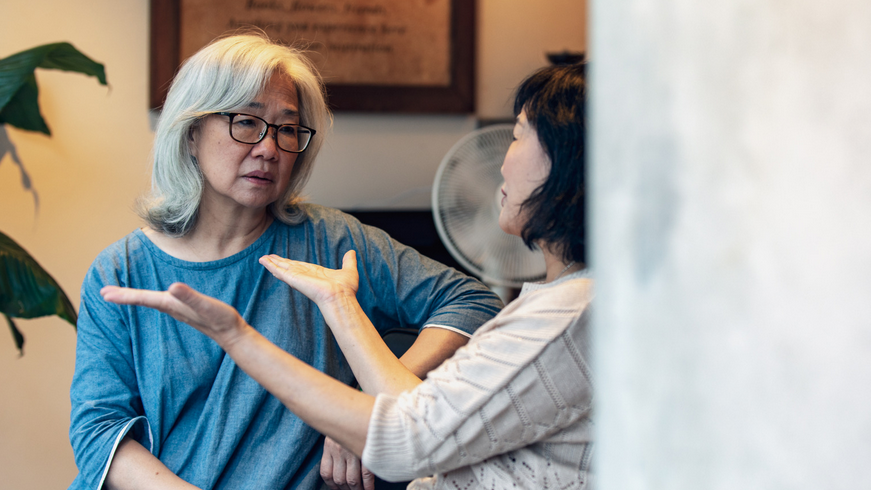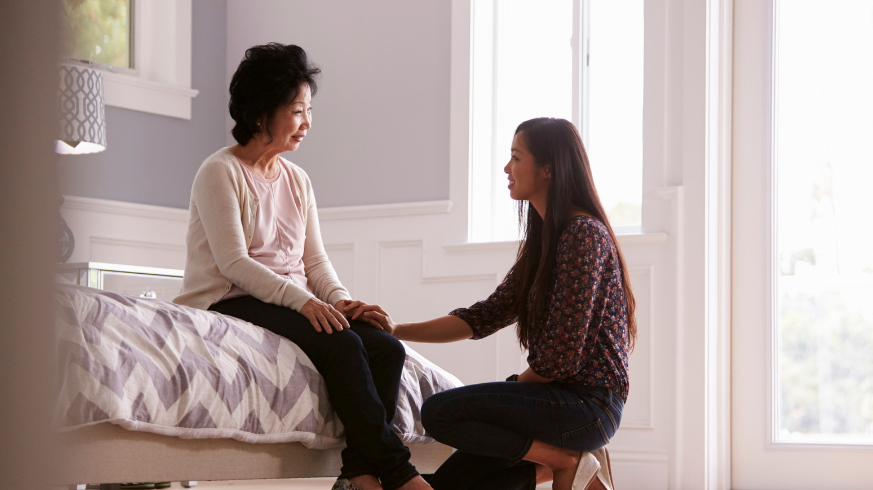What Every Family Should Know About Paranoia in Elderly

It’s a difficult time for family members, and it can really affect the way you view your aging loved one. You may need to isolate that person from everyone around you, reinforcing the paranoia.
The possibility that a person can develop paranoia as they age is alarming. However, it’s essential to know how to handle someone who has dealt with this disorder previously so that you and your loved one feel safe and secure.
Read on to learn exactly how paranoia in the elderly develops and how to deal with it appropriately.
What is Paranoia?
Paranoia is a mental disorder that causes someone to have unreasonable fears about other people and situations that are not based on reality. A person suffering from paranoia may also distrust others or feel that others are out to get them, even when there is no evidence.
Although paranoia is not necessarily a result of aging, it can happen to anyone, especially older adults. It usually doesn’t cause problems until it builds up over time. The lack of trust in others may make them hesitant to ask for help when needed.
In the case of an aging loved one, paranoia might be a mild case or a full-blown mental disorder. Also, because their mental state may deteriorate, they might be more susceptible to it.
What Causes Paranoia?
Paranoia is a symptom of psychosis, which occurs when an individual’s mental processing becomes disconnected from reality. While there can be many different triggers for this condition in seniors, it tends to happen as the result of one (or more) of these symptoms:
1. Delirium
Delirium is a sudden change in a mental state that can occur as a result of many different factors—an underlying medical condition, such as dehydration or infection, usually cause it. Symptoms include confusion, restlessness, and agitation.
2. Dementia
Dementia is a chronic, degenerative disease that affects the brain. It can cause symptoms such as memory loss and confusion. People with dementia may also believe others are trying to hurt or steal from them.
3. Depression & anxiety
Depression and anxiety are the most common symptoms of paranoia. In both cases, a person may feel like they have something to hide or be afraid of being judged. This fear can cause them to believe others can read their thoughts or control their actions.
4. Drugs & alcohol

Drugs and alcohol can cause paranoia. They interfere with how your brain processes information, which may cause you to think there are people out to get you or someone trying to harm you.
5. Sleep disorders
If you are having trouble sleeping, you may start to feel paranoid. This is because sleep is important for your brain to function properly. It helps your body repair itself and gives your mind a chance to rest. With proper sleep, thinking clearly and making good decisions can be easy.
6. Delusional disorders
Delusional disorders are a type of mental illness. They cause you to have false beliefs that other people disagree with. You might think someone is out to get you or plotting against your best interests. This can lead people with delusional disorders to form strange opinions about the world around them.
What Are the Symptoms of Paranoia in the Elderly?
The symptoms of paranoia in the elderly can be hard to notice, mainly if you are not accustomed to your loved one’s behavior. Paranoia can present as a distrust of others or a feeling that people are talking about you. If your loved one is suffering from paranoia, they may also exhibit signs such as:
- Suspicious behavior- Older adults with paranoia often fear that their family members are trying to harm or steal from them. They might accuse their family members of stealing money or food and refuse to let them into the house. They may also be suspicious of strangers, believing they are trying to harm or rob them.
- Fear of being alone- People with paranoia may go to great lengths to keep themselves company, even going as far as lying to others about where they are in order to make them feel comfortable.
- Fears about their health- Some older adults develop concerns about their physical health due to paranoia. They might think something is wrong with them and fear doctors will discover these problems when examined.
- A belief that they are being watched- Many elderly people who suffer from paranoia believe that someone is watching them. They might think that their neighbors are peeping at them through the windows or that strangers are following them around town.
- Social withdrawal- If you have noticed that your loved one is withdrawing from regular activity, it could be a sign that they are paranoid or suffering from another mental disorder.
Paranoia can be a lifelong mental illness that takes many forms. It may start as mild anxiety and intensify over time, depending on your family member’s state of mind.
Red Flags of Paranoia in the Elderly

While some older adults may be able to deal with paranoia on their own and carry on with their usual activities, others will need help from their loved ones. Knowing the red flags can help you recognize when your loved one needs more support or professional use. These red flags include the following:
- Unusual restlessness or fear that you can’t easily explain.
- Saying things that seem odd or insensible to others
- Unrealistic feelings of persecution and unwarranted guilt.
- Hearing strange noises can be unsettling, but it may also mean that your loved one’s hearing aids fail to pick up certain frequencies.
- Accusing those who care for them or family members of stealing from them
- Constantly keeping the blinds closed at home and avoiding going outside.
- Accusing a spouse of being unfaithful
Paranoia and Hallucinations: What’s the Difference?
They are both symptoms of mental illnesses, but they’re not the same thing.
Paranoia is a feeling that other people are out to get you or hurt you. You may feel like people are following you or watching your every move, even though that’s not true.
Hallucinations are when you see or hear things that aren’t there. You might hear voices telling you to do something bad or see something that isn’t there—like bugs crawling on your skin or someone standing in front of your door.
Both paranoia and hallucinations can be symptoms of mental illnesses like schizophrenia or bipolar disorder. But they can also happen with Alzheimer’s disease and dementia—especially if they start at an early age.
How Can Caregivers Help Manage the Symptoms of Paranoia in Elderly People?
It’s well-known that paranoia can be a complex problem for seniors and their caregivers. Seniors may begin to mistrust those closest to them—causing distress in the people who love them most—but there are ways that caregivers can help manage these symptoms. Here are some tips to help seniors with paranoia:
1. Remember to consider subtle changes in behavior.

These can be signs of a broader problem. If someone begins to feel stressed or anxious when they are not, it may mean that something in their environment has changed, and the person is no longer comfortable there.
2. Avoid arguing with them.
Paranoid delusions are real to those who experience them, but arguing will only convince someone with dementia that you aren’t on their side. Reassure and validate your elderly loved one’s feelings rather than trying for rational explanations or answers—this may help reduce paranoia.
3. Acknowledge the elderly’s right to personal privacy.
Ensure their room is clean and well-lit, with decorations stimulating the senses. If they have roommates or live in a community setting, ensure they have somewhere to store valuables—such as a safe or lockbox. Always ask permission before you enter a senior’s personal space.
4. Keep a journal of their day-to-day behavior to detect improvements or regressions.
Keep notes on what time of the day they wake up and tend to check in more often if their behavior worsens. They might be more willing to talk about their experiences if you consistently ask them about what’s happening around them but don’t push them.
5. Reach out to a caregiving professional for support.

There is no shame in seeking help, especially if you notice a change in someone’s behavior. Don’t be afraid to call on your own family doctor or mental health care provider to recommend treatment or a mental health facility. It’s better to be safe than sorry.
6. Be patient.
It could take some time for behaviors to settle down. Don’t be discouraged if you notice a change in behavior months after the initial incident. Be patient with your loved one and have faith that time will help them cope with paranoia and other symptoms of mental illness.
Conclusion
Paranoia, when it becomes more serious, causes people to lose their ability to function in their normal routines. They become victims of their minds and feel everything is out to get them. You want to be at them all the time to give assurance and provide everything they need; however, when you also have other things to do, it would be difficult to run around them all the time. At this time, having someone to look for your elderly loved one when you are not around will be very much of help. You will not have to worry and can serve your other duties without worrying about your loved one.
This is why it is very important for you to have a home care agency that provides the best in-home care services. The professionals would be with them all the time and ensure that everything is being provided for them in the best possible way, such as their physical and emotional needs. Serenity Senior Care is a great home care agency that will greatly help you. If you want to learn more about our services or schedule a free consultation, please call us today. We look forward to assisting you!


